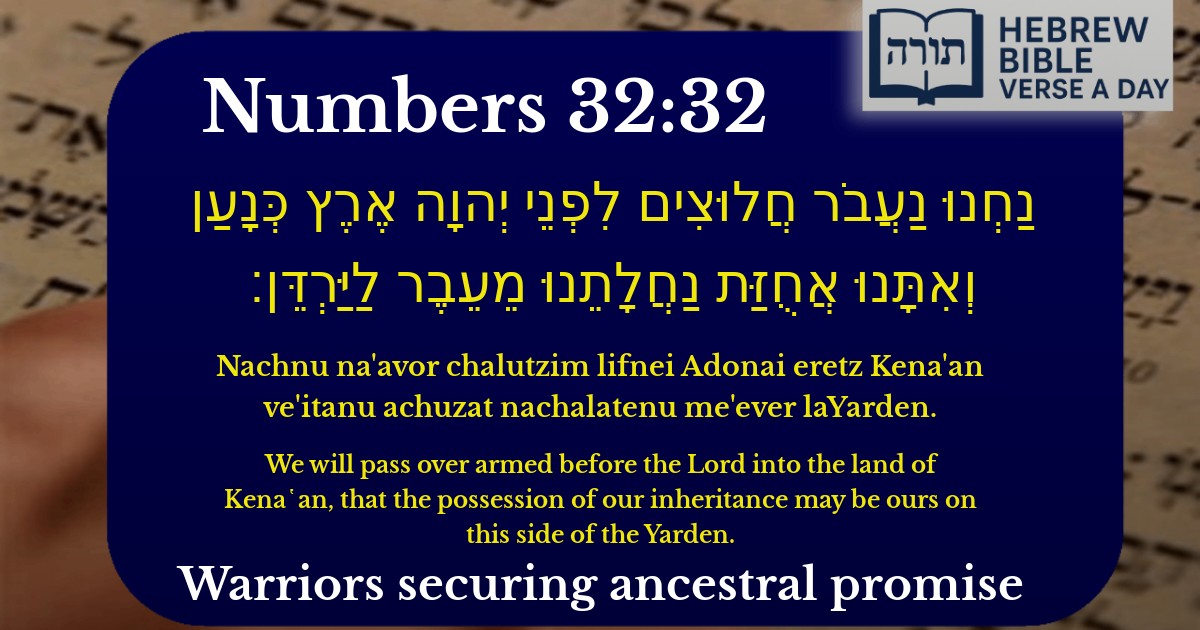Frequently Asked Questions
Q: What does Numbers 32:32 mean?
A: Numbers 32:32 refers to the tribes of Reuven and Gad promising to help the other Israelites conquer the land of Canaan (Eretz Yisrael) before settling on the eastern side of the Jordan River. They vowed to fight alongside their brethren 'armed before the Lord,' showing their commitment to the collective mission of settling the Promised Land.
Q: Why is this verse important in Jewish tradition?
A: This verse is important because it demonstrates the unity of the Jewish people and the responsibility tribes had toward one another. Even though Reuven and Gad wanted land outside Canaan, they committed to helping the others first (Rashi on Numbers 32:16). This teaches the value of mutual responsibility (ערבות הדדית) in Jewish tradition.
Q: What lesson can we learn from Numbers 32:32 today?
A: The verse teaches that personal interests should not override communal obligations. Reuven and Gad could have settled immediately, but they prioritized helping their brothers first. Today, this reminds us to support our community's needs before focusing solely on our own benefits (based on Rambam's principles of communal responsibility).
Q: Why did Reuven and Gad want land on the other side of the Jordan?
A: The Midrash (Bamidbar Rabbah 22:7) explains that Reuven and Gad had large flocks and saw that the eastern side of the Jordan (Gilead) had good pastureland. Moshe initially criticized them for seeming to abandon the mission of entering Canaan, but they clarified they would fight alongside the other tribes first (Numbers 32:16-32).
Q: How does this verse connect to Jewish ownership of the Land of Israel?
A: This verse reinforces that all tribes had a share in Eretz Yisrael (Canaan), even if some settled outside its borders. The Talmud (Bava Batra 121b) discusses land inheritance laws based on such verses, showing that Jewish connection to the land is both spiritual and legal under Torah law.


Context in the Torah
The verse (Bamidbar 32:32) is part of the dialogue between Moshe and the tribes of Reuven and Gad, who requested to settle on the eastern side of the Jordan River (Ever HaYarden). They assured Moshe that they would join the other tribes in conquering Eretz Canaan before returning to their allotted territory.
Phrase Analysis: "נַחְנוּ נַעֲבֹר חֲלוּצִים"
Rashi explains that "חֲלוּצִים" (chalutzim) means "armed" or "prepared for battle," derived from the root ח.ל.צ., indicating readiness. The tribes emphasized their commitment to fight alongside their brethren despite having their inheritance on the other side of the Jordan.
Spiritual Dimension: "לִפְנֵי יְהוָה"
The Sforno notes that "before Hashem" signifies that their participation in the conquest was not merely a military obligation but a divine mission. They recognized that the battle for Eretz Yisrael was under Hashem's guidance, as stated in the Torah (Devarim 20:4).
Inheritance and Unity
The Ramban highlights that the tribes stressed "אֲחֻזַּת נַחֲלָתֵנוּ" (our inheritance) to reassure Moshe they would not abandon their responsibility. The Midrash Tanchuma (Bamidbar 7) praises their commitment to unity, as they prioritized the collective need over personal convenience.
Halachic Implications